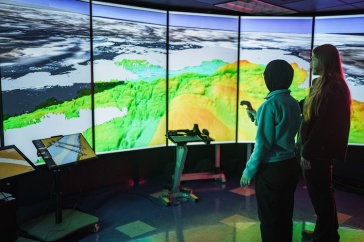
With an unemployment rate just under 3 percent and an aging population, it’s not hard to imagine a shortage of skilled workers in key areas around New Hampshire. To help increase that pool, UNH Durham, UNH Manchester and the UNH School of Law have added new majors, minors and certificate programs in areas where marketplace demand is critical and where student interest has steadily grown. Here’s a sampling of some of the additions made during the last few years across the three campuses.
Biomedical science (B.S.) Durham
According to a 2010 U.S. News & World Report article, biomedical professions are among the 50 best careers to pursue. To that end, UNH’s biomedical science program offers degree options in medical laboratory science, medical microbiology and medical and veterinary sciences (MVS).
With shortages of medical professionals looming ever larger in coming years, UNH’s biomedical sciences major is a logical choice for students seeking a career in the medical, veterinary or biomedical research fields. In 2017, UNH graduates of medical and veterinary sciences achieved a 100-percent success rate in acceptance to veterinary programs. Applicants to medical and dental programs from the MVS option were equally successful; since 2014, 51 percent of applicants to medical schools and 100 percent of applicants to dental schools were accepted.
“The biomedical science major, with its three specialized options, offers outstanding preparation for careers in a broad range of biomedical fields,” says Rick Cote, chair of the molecular, cellular and biomedical sciences department. “The medical laboratory science program addresses a critical shortage of trained professionals while the medical microbiology program provides skills for immediate employment in laboratories.”
Ocean engineering (B.S.), Durham

Ocean engineering is a budding field that, according to the Bureau of Labor Statistics, will grow by 14 percent during the coming decade. That means there will be a need for engineers who are trained to solve problems associated with the sustainable use of ocean resources and the scientific exploration and study of the ocean environment.
“With only eight accredited programs nationwide, this suggests a significant demand for people with this experience,” says Diane Foster, professor and director of the ocean engineering program in the College of Engineering and Physical Sciences. “Our goal is to produce the next generation of ocean engineers who will address the future technology, infrastructure and exploration needs present in our changing ocean.”
The program emphasizes ocean engineering fundamentals with interdisciplinary opportunities in civil, electrical, environmental or mechanical engineering as well as marine sciences.
Psychiatric mental health nurse practitioner (post-master’s degree), Durham
“The program was added to address the significant workforce shortages leading to long waiting lists for an appointment for mental health services in our state.”
Many New Hampshire residents in need of mental health care end up being hospitalized due to a lack of providers in their communities, according to state agencies — and that’s only if a bed is available. In 2016, the opening of New Hampshire’s 10-bed mental health crisis unit was delayed in part because of a shortage of specialized nurses.
That kind of need was behind this year’s launch of the psychiatric mental health nurse practitioner program in the College of Health and Human Services. It is designed for nurse practitioners with master's degrees who have at least one year’s experience in primary care practice.
“The program was added to address the significant workforce shortages leading to long waiting lists for an appointment for mental health services in our state,” says Dayle Sharp, clinical associate professor and director of nurse practitioner programs.
Analytics and data science (multiple options), Durham and Manchester
Two career options for analytics and data science majors hold top spots on the cbsnews.com list of the best 11 jobs in America for 2017; in fact, data scientist is number one and analytic manager is number five, underscoring the high demand for data-savvy individuals in today’s business world.
At UNH, students working toward a Master of Science degree in analytics will receive extensive training in quantitative analysis, applications and reasoning, critical thinking and analytics. Two certificate programs, one in analytics and the other in introduction to data science, are available through the graduate school. And undergraduates at UNH Manchester in the process of getting their Bachelor of Science degrees will learn the technical skills needed to manage, distill and interpret data.
UNH also offers a dual master’s degree in public policy and analytics, which provides students with the foundation needed to analyze critical societal issues, develop policy solutions and translate analysis into action.
Homeland security (B.S.), Manchester and Durham
James Ramsay started teaching homeland security (HLS) courses at UNH Manchester in 2015. Market demand was behind the new major, he says, adding that homeland security programs have been growing rapidly across the country.
“The homeland security major was built as a classic liberal arts degree that addresses the causes of conflict and the threats to U.S. national and homeland security,” says Ramsay, professor of security studies and coordinator of the homeland security program. In addition to market needs, there also was a “tremendous interest by students who wish their jobs to be meaningful and who want to significantly contribute to the democracy,” he says.
An HLS degree offers multiple career tracks in law, policy, cybersecurity, emergency management, risk management, intelligence studies, terrorism studies, environmental and human security, strategic planning and local, state and federal law enforcement.

Cheryl Parker ‘00, UNH brewery manager
Brewing science (minor) Durham
Answering the call of a growing career path interest is UNH’s new brewing science minor, which includes an onsite pilot brewery. Consider the statistics: In 2016, the number of breweries in the U.S. grew 16.6 percent, providing nearly 129,000 jobs — 7,000 more than in 2015.
“New Hampshire has gone from less than 10 breweries in 2011 to almost 70 in 2017, with more in the planning stages,” says Cheryl Parker ‘00, brewery manager and instructor. “Brewing encompasses biochemistry, microbiology, engineering, physics, math, business and creativity, making it truly an interdisciplinary industry. This type of learning can then be applied to any industry that the student chooses to pursue.”
Any student, regardless of their major, can pursue the brewing minor.
Other new majors, minors and concentrations
Sustainability dual major, Durham
Dual degree in law and master’s degree in public policy (JD/MPP), Durham and UNH School of Law
Bakery and pastry arts (concentration), Durham
Philosophy (BA) with ethics and social responsibility option, Durham
Spanish, accelerated five-year BA/MA, Durham
Leadership (minor), Durham
-
Written By:
Jody Record ’95 | Communications and Public Affairs | jody.record@unh.edu
















































